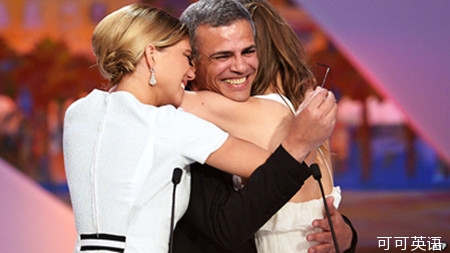Books and Arts; Film Review;The Cannes film festival; Subtle story;
Abdellatif Kechiche's film, “La vie d'Adele”, carries off the top prize;
At A time of national collective depression in France, the Cannes film festival is a precious moment: an occasion to show the world that it can still host the most prestigious film festival, throw star-studded parties and draw the best Hollywood talent. Over the years, Cannes has also become a chance for the industry to make a point, and it was easy to see one in this year's winner of the Palme d'Or, the festival's top prize. It went to “La vie d'Adele” (“Blue is the Warmest Colour”), a three-hour erotic lesbian drama directed by a Tunisian-born director, Abdellatif Kechiche. “A perfect symbol,” mused Libération.
在法國(guó)舉國(guó)籠罩在陰郁之下時(shí),戛納電影節(jié)成為其最閃耀的一刻:法國(guó)向世人證明了自己仍舊可以舉辦世界上最具盛名的電影節(jié)、眾星云集的晚會(huì),同時(shí)也吸引著每一位好萊塢明星。多年來(lái),戛納一直都是電影業(yè)界闡述觀念的舞臺(tái),而今年的金棕櫚獎(jiǎng)——戛納電影節(jié)最高獎(jiǎng)項(xiàng)的獲獎(jiǎng)得主,也能夠看出這一點(diǎn)。今年的獲獎(jiǎng)影片是由出生在突尼斯的導(dǎo)演阿布戴·柯西胥執(zhí)導(dǎo)、以三小時(shí)時(shí)長(zhǎng)講述了女同性戀故事的《阿黛爾的生活》(《藍(lán)色是一種暖色調(diào)》)。法國(guó)解放報(bào)這樣寫(xiě)道:“這是一個(gè)完美的象征。”

Adele, a pupil at a multicultural school in Lille, wants to become a teacher. Played by the 19-year-old Adele Exarchopoulos, an acting revelation, she is thrown into disarray, then ecstasy, then melancholy by an explosive love affair with Emma (Léa Seydoux), an art student from a liberal-intellectual milieu, with gamine looks and blue-dyed hair. It is an unsentimental coming-of-age film about womanhood, a tale of passion and anger, and an unapologetically graphic love story.
影片主角阿黛爾是法國(guó)里爾市一所多文化學(xué)校的一名學(xué)生,她的夢(mèng)想是成為一名老師。這個(gè)角色由演技頗具啟示的阿黛爾·艾克阿切波洛斯扮演,在影片中因她與出身自由而又學(xué)術(shù)的、一頭藍(lán)發(fā)散發(fā)著假小子氣質(zhì)的藝術(shù)學(xué)生艾瑪(由蕾雅·賽杜扮演)的戀情,而使得她的人生陷入混沌,繼而狂喜,繼而憂(yōu)郁。影片對(duì)于女性的刻畫(huà)真實(shí)且成熟,就像是一個(gè)充斥激情與激憤的故事,也像是一段清楚直白不做作的愛(ài)情故事。
Steven Spielberg, an American director and this year's jury president, dismissed any political symbolism. “Politics”, he said, “was not in the room with us.” Yet the Palme d'Or was awarded on a day when protesters took to the streets in Paris for a mass demonstration against a new law that has legalised gay marriage in France, and after a period marked by homophobic violence. By exploring a love affair between two women, the Franco-Tunisian Mr Kechiche has also made a bold point about female liberty. And he dedicated his prize to youth in both France and Tunisia, “so as to inspire them to live in freedom.”
作為今年電影節(jié)的評(píng)審團(tuán)主席,美國(guó)導(dǎo)演史蒂文·斯皮爾伯格拒絕任何形式上將電影同政治相關(guān)聯(lián)。他說(shuō):“政治,絕不是我們考慮的因素。”然而,金棕櫚獎(jiǎng)?lì)C發(fā)前,是一段充斥著反同性戀暴力的時(shí)間,在這個(gè)獎(jiǎng)?lì)C發(fā)時(shí),法國(guó)反對(duì)同性婚姻合法化法律的示威者正在巴黎街頭舉行游行抗議。突裔法國(guó)導(dǎo)演柯西胥通過(guò)探索女性之間的愛(ài)情,在女性自由解放中邁出了堅(jiān)定的一步。他把他的獎(jiǎng)獻(xiàn)給所有法國(guó)和突尼斯的青年人,“為了讓他們能夠更加自由的生活。”
Does Cannes need to shock? Past juries have delighted in making mischievous political choices. When Michael Moore won the 2004 prize for “Fahrenheit 9/11”, his anti-George Bush documentary, he got a 20-minute standing ovation. In recent years, the gong has often gone to films that grasp nettlesome subjects, such as Cristian Mungiu's “4 Months, 3 Weeks and 2 Days” (abortion) or Ken Loach's “The Wind that Shakes the Barley” (Irish independence).
戛納會(huì)不會(huì)對(duì)此感到震驚?以前的評(píng)審團(tuán)經(jīng)常做一些與政治相關(guān)的選擇。當(dāng)麥克·摩爾2004年憑借批判喬治·布什總統(tǒng)的紀(jì)錄片《華氏911》獲獎(jiǎng)時(shí),人們起身為他喝彩了20分鐘。而近年來(lái),獲獎(jiǎng)的總是些圍繞著惱人事件的電影,比如說(shuō)克里斯蒂安·蒙吉的《四月三周兩天》(有關(guān)墮胎)或者是肯·洛奇的《風(fēng)吹稻浪》(愛(ài)爾蘭獨(dú)立)。
Yet, judging by the near-unanimous critical approval, “Adele” has married both political importance and artistic merit. Libération called it “dazzling”, a “film that floated above all the others”. Le Monde described it as “an emotional, erotic shock”. Variety labelled it “a searingly intimate character study”. Better known for his gritty but charming dramas set in heavily immigrant France (“L'Esquive”, “La Graine et le Mulet”), Mr Kechiche's latest film is also in many ways a product of the French mainstream: a risqué movie, shot in close-up, celebrating independence and passion, starring two white leading actresses, and with minorities as mere extras. For all his north African sensibility, Mr Kechiche now looks every bit a part of the French film-making establishment.
然而,從一致的評(píng)論中可以看出,《阿黛爾的生活》是政治因素和藝術(shù)價(jià)值的結(jié)合體。法國(guó)《解放報(bào)》稱(chēng)其“亂花漸欲迷人眼。”,是“一部領(lǐng)先的電影”。《世界報(bào)》將電影描述為“情感豐富,充滿(mǎn)情欲”。《綜藝》給它貼上了“熾熱的親密關(guān)系研究”的標(biāo)簽。導(dǎo)演柯西胥更多的是知名于他那些描述法國(guó)移民的堅(jiān)毅、頗具魅力的電影(《躲閃》、《谷子和鯔魚(yú)》),而他的新作品在很多方面也都緊貼潮流:淫穢電影、近景拍攝、歡慶獨(dú)立與激情、兩名白人女主角而民族僅作為附加部分。他對(duì)于北非的感受力,讓現(xiàn)在的他成為了法國(guó)電影史成就的一部分。











